

China's Bubble Economy - The well-regarded and surprisingly independent Beijing-based media outlet Caijing is no more.
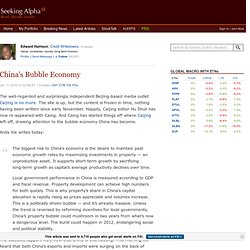
The site is up, but the content is frozen in time, nothing having been written since early November. Happily, Caijing editor Hu Shuli has now re-appeared with Caing. And Caing has started things off where Caijing left off, drawing attention to the bubble economy China has become. China growth sizzles, inflation bubbles. The Chinese Real Estate Sector Is Unraveling. As a prelude to a broader analysis of China’s GDP, and the accuracy of its official GDP figures, I want to start by examining the national real estate statistics for the first four months of 2012.
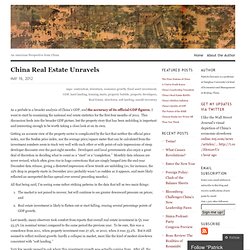
This discussion feeds into the broader GDP picture, but the property story that has been unfolding is important and interesting enough to be worth taking a close look at on its own. Getting an accurate view of the property sector is complicated by the fact that neither the official price index, nor the Soufun price index, nor the average price/square meter that can be calculated from the investment numbers seem to track very well with each other or with point-of-sale impressions of steep developer discounts over the past eight months.
Developers and local governments also enjoy a great deal of discretion in deciding what to count as a “start” or a “completion.” Patrick Chovanec: Domino Effect In Cina. China's Debt Bomb - By Jonathan Kaiman. TIANJIN, China — The Binhai New Area in the municipality of Tianjin looks like a cross between a desolate stretch of the New Jersey Turnpike and the bottom of the ocean.
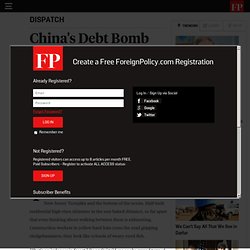
Half-built residential high-rises shimmer in the sun-baked distance, so far apart that even thinking about walking between them is exhausting. Construction workers in yellow hard hats cross the road gripping sledgehammers; they look like schools of weary-eyed fish. "That's an indoor rain forest," Dong Cui told me as she waved toward an I.M. Pei-style glass pyramid through the window of her silver Audi A6. "This is a cruise port," she said later, pointing at a curvy postmodern edifice many miles down the highway. Welcome to Tianjin, China's sixth-most populous city and perhaps its biggest property bubble. Binhai's scope is difficult to fathom. Binhai officials have borrowed upwards of $64 billion to finance their vision, and their strategy seems to be working. Hidden Losses And Little Reform: China May Be Slowing More Than You Think. In his latest Email review, Michael Pettis at China Financial Markets discusses financial reform (actually the lack thereof in China), as well as an observation on China's Growth.
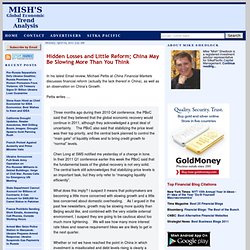
Pettis writes .... Three months ago during their 2010 Q4 conference, the PBoC said that they believed that the global economic recovery would continue in 2011, although they acknowledged a great deal of uncertainty. The PBoC also said that stabilizing the price level was their top priority, and the central bank planned to control the “main gate” of liquidity inflows and to bring credit growth to “normal” levels. Yum cha economics. By Michael Feller Several weeks ago, blogger Sell on News explored the connection between financial terminology and water (liquidity, droughts, flows, waves).
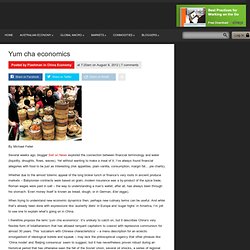
Yet without wanting to make a meal of it, I’ve always found financial allegories with food to be just as interesting (risk appetites, plain vanilla, consumption, margin fat… pie charts). Whether due to the almost totemic appeal of the long broker lunch or finance’s very roots in ancient produce markets – Babylonian contracts were based on grain, modern insurance was a by-product of the spice trade, Roman wages were paid in salt – the way to understanding a man’s wallet, after all, has always been through his stomach. Even money itself is known as bread, dough, or in German, Eier (eggs).
When trying to understand new economic dynamics then, perhaps new culinary terms can be useful. Global Economics - Global Macro EconoMonitor. A few months ago I discussed the failing of econophysics, and more generally, the economic paradigm that treats people like computers and views economic dynamics like physics.
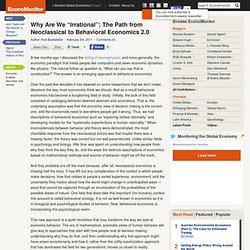
The natural follow up question is, “What can you say that is constructive?” The answer is an emerging approach to behavioral economics. Over the past few decades it has dawned on some researchers that we don’t make decisions the way most economists think we should. And as a result behavioral economics has become a burgeoning field of study. Initially, the bulk of this field consisted of cataloging behavior deemed aberrant and anomalous. Demand For Electric Cars Such As Nissan Leaf And Chevy Volt Could Dwarf Supply. Editor's Note: Anton Wahlman is a contributor for TheStreet.com.

Is Jim Chanos Right About China? Some selected Chinese data for September off pf Bloomberg.
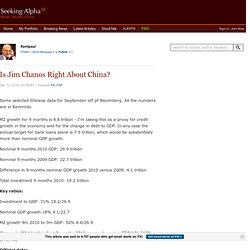
All the numbers are in Renminbi. M2 growth for 9 months is 8.6 trillion - I'm taking this as a proxy for credit growth in the economy and for the change in debt to GDP. In any case the annual target for bank loans alone is 7.5 trillion, which would be substantially more than nominal GDP growth. Nominal 9 months 2010 GDP: 26.9 trillion Nominal 9 months 2009 GDP: 22.7 trillion. TOP 5 GRAPHS OF THE WEEK – THE CHINA OUTLOOK. By Econ Grapher This week the focus is on China, with the quarterly statistics out this week – as well as a surprise interest rate increase from the PBOC.
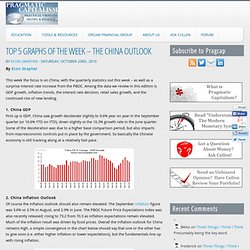
Among the data we review in this edition is GDP growth, inflation trends, the interest rate decision, retail sales growth, and the continued rise of new lending. 1. China GDP First up is GDP, China saw growth decelerate slightly to 9.6% year on year in the September quarter (or 10.6% YTD on YTD), down slightly vs the 10.3% growth rate in the June quarter.
A Conversation with George Soros. With thanks to Felix Salmon for arranging the invitation.

There’s an episode of House where he has to get rid of one of the people for his new team. By the end of the episode, the sharpest person in the group has said everything that we would have expected to hear from House—and is therefore summarily dismissed, since hearing one’s own opinions being spoken by someone else is less useful than being challenged. I had a similar feeling with George Soros’s conversation last Wednesday morning with Chrystia Freeland, sponsored by Reuters and held in the NASDAQ building that, er, graces Times Square. This Is Why The BP Disaster Will Be Easily Forgotten And Boom Times Are Ahead For Oil & Gas. China's Stress Tests: 60% Decline in House Prices. Two 200-Day Breaks - INTERVIEW WITH A CHINESE REAL ES. There has been much chatter in recent week’s regarding China’s potential bubble economy. As we now know, the Chinese government poured in more stimulus per GDP than the United States and with their economy rebounding substantially faster it looks like they are having trouble containing the red hot growth in the broad economy and in asset prices.
This has been nowhere more apparent than it is in Chinese real estate where there is now enough commercial real estate to provide a 5X5 cubicle for every man, woman and child in China. China International Business recently sat down to interview Zhang Xin, CEO of SOHO China, Beijing’s largest commercial property developer.
What really drove Chinese commodity imports? Jim Chanos Is Wrong: There Is No China Bubble - This column originally appeared in Forbes. The famed short-seller Jim Chanos has been making waves lately by saying he thinks China is in a bubble and ready to collapse in 2010. He argues that easy credit has let real estate and stock market prices shoot upward. He also says the Chinese government is cooking the numbers to show 8% growth in gross domestic products, when actually China can't keep growing when the rest of the world has been hit so hard by the financial crisis.
Chanos called it right on Enron and Tyco before they collapsed. People's Bank of China Currency Reserves: Biggest Bubble of All. China should cut 'excessive' ore imports, group says - The China. EPI Releases - Plan B 4.0 by the Numbers - Data Highlights on Ch. China tightening? Yeah right. China's global shopping spree. Is the World’s Future Resource Map Tilting East? Think of it as a tale of two countries. When it comes to procuring the resources that make industrial societies run, China is now the shopaholic of planet Earth, while the United States is staying at home.
China`s CIC fund bets on North American coal, gold, iron ore, po. Chinese copper demand looks extremely robust. Chinese apparent demand looks extremely robust, but there are doubts on whether this can last. Beijing will be keeping a watchful eye over China’s economy to ensure over-heating is nipped in the bud – figures.. 19 May 2010 Macroeconomic affairs continue to dominate price direction in copper, while fundamentals play second fiddle.
The copper price dipped below $7,000/t in early May after flirting with $8,000/t less than a month earlier. Untitled. China’s commodities/property price nexus. Hugh Hendry Will Make $500 Million Off $2.7 Million If China Col. April 2012 Hugh Henry. Chinese plunge protection back in action. China's Currency Regime Shift Will Ultimately Be Deflationary. China Continuing to Obtain Gas Resources - Commodities & Futures. Last week, major gas and oil producer PetroChina (NYSE:PTR) announced intentions to spend $5.4 billion to obtain a fifty percent stake of EnCana Corp.'s (TSE:ECA) Cutbank Ridge resource located in British Columbia. The recent deal represents the biggest investment to date by a Chinese company in the North American energy sector, appearing to balance demand to develop gas fields at a time when low commodity prices are not providing companies with enough cash flow to do it as quickly as they would prefer.
The agreement is still subject to a foreign investment review by Industry Canada. If China Blows Up, So Will Every Other Market - Robert Lenzner - StreetTalk. China’s Drought: It’s Our Problem Too « ChinaMusings.com. China’s drought is bad, the worst in at least 60 years. Roughly 12.5 million acres of winter wheat crop have been damaged. And a United Nations Food and Agriculture Organization (FAO) alert reported last week that 2.57 million people and 2.79 million livestock are suffering from shortage of drinking water.